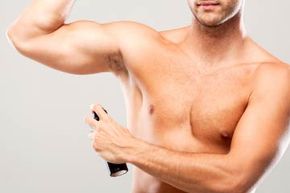If you spend a winter's day indoors reading a book, you likely won't have a particularly strong reason to apply deodorant or antiperspirant to your underarms. But if you're doing yard work in the summer, or giving a speech in a convention center, your body's either going to heat up or crank up the adrenaline. The result's the same: you're going to sweat.
Usually, a couple swipes of deodorant is all you need to be confident that when you walk into a room, other people won't start walking out. But for some people, a couple swipes -- and a couple more, and a couple more -- just isn't enough.
Advertisement
While the amount we sweat varies from person to person due to genetics, environment and other factors, some of us sweat way more than others. It's not uncommon for a person with hyperhidrosis (overproduction of sweat) to sweat four times more than other people [source: Cohn]. Their sweating may leave their clothing soaked, and they may sweat for no clear reason at all. People with hyperhidrosis may even sweat in their sleep. When episodes occur, their palms become so slick they have trouble holding items in their hands. Their feet sweat. Rivers of moisture pour off their forehead and face. And the armpits? Forget it.
If you experience an unusual spike in sweating (or sweat all the time), you should talk to your doctor about it. But you may also want to try a clinical deodorant/antiperspirant. They work by providing higher concentrations of pore-blocking metallic salts (often 25 percent more) [source: Newman]. It's recommended you apply the product at night before you go to bed (and possibly again in the morning) so that it has time to settle in, increasing its effectiveness [source: International Hyperhidrosis Society].
Clinical deodorant/antiperspirants can even be applied to your face and other parts of your body, but they may cause skin irritation, so start off using it sparingly and only on parts of your skin to see how your body will react.
For some with hyperhidrosis, clinical deodorant/antiperspirants provide effective treatment for excessive sweating. And if your perspiration is driving you crazy, these products may be something you want to try.
Advertisement


